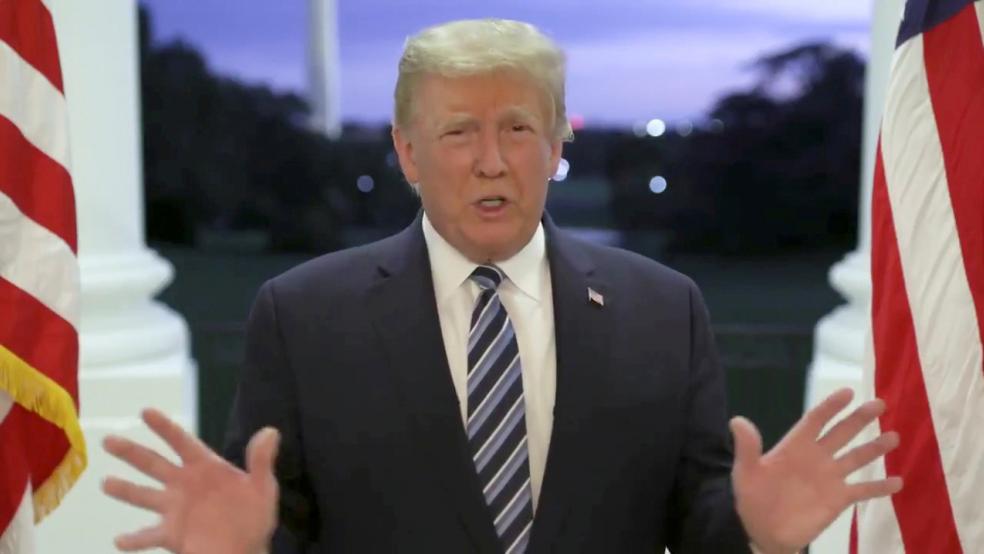President Trump said Tuesday that he instructed White House negotiators to cut off talks on another coronavirus relief package until after the November elections.
In a series of tweets posted less than a day after he was released from the hospital, Trump accused House Speaker Nancy Pelosi of “not negotiating in good faith” and claimed that Democrats were seeking to bail out “poorly run” blue states by providing funding unrelated to the pandemic.
“I have instructed my representatives to stop negotiating until after the election when, immediately after I win, we will pass a major Stimulus Bill that focuses on hard-working Americans and Small Business,” Trump wrote.
The two sides were not close to an agreement, but they had resumed talks after weeks of inaction and appeared to be making modest progress in narrowing their differences. House Democrats passed a $2.2 trillion package last week, while Treasury Secretary Steven Mnuchin had offered $1.6 trillion. But Trump and other Republicans have long objected to providing significantly more aid to states, and the issue remained one of several obstacles to a deal. (Reminder: Red states face a fiscal crunch, too, as a result of the pandemic.)
Trump’s announcement Tuesday reportedly came after a conference call with Mnuchin and Republican congressional leaders. In his tweets, Trump said he had asked Senate Majority Leader Mitch McConnell (R-KY) to focus on confirming Amy Coney Barrett, his nominee to the Supreme Court.
Pelosi ripped Trump’s move. “Today, once again, President Trump showed his true colors: putting himself first at the expense of the country, with the full complicity of the GOP Members of Congress,” Pelosi said in a statement. “Walking away from coronavirus talks demonstrates that President Trump is unwilling to crush the virus. … Clearly, the White House is in complete disarray.”
What it means: More economic suffering is likely, at least in the near term. Many analysts say that the economy still requires additional support to stave off more prolonged weakness, and before Trump made his announcement, Federal Reserve Chair Jerome Powell again urged lawmakers to provide more aid. Powell warned that the economic outlook remains uncertain and suggested that it would be better to do too much than too little. (See more on Powell’s comments below.)
Others lamented the likely economic toll. “As we speculate on why Trump would kill a relief bill, think of the damage—foeclosures [SIC], evictions, businesses cratering, states struggling to fund anything, hospitals bracing for a new Covid wave without PPE,” Norman Ornstein, resident scholar at the American Enterprise Institute, tweeted. “This more than an election ‘strategy.’ It is a human tragedy.”
A surprising turn by Trump: The president himself said just a few days ago that the country needed a stimulus bill. “OUR GREAT USA WANTS & NEEDS STIMULUS. WORK TOGETHER AND GET IT DONE,” he tweeted from the hospital on Saturday. On Tuesday, though, he tweeted that the economy “is doing very well” and touted the jobs rebound and the stock market’s gains (stocks turned sharply lower on Trump’s tweet).
The Washington Post’s Erica Werner and Jeff Stein called out some of the issues with Trump’s rosier outlook:
“Even some of Trump’s top advisers have said the economy is not doing very well and that more assistance is needed. Further, the stock market is not at record levels, and it also doesn’t reflect the broader health of the economy. The unemployment rate has come down from its April peak of around 15 percent, but it is still at 8.4 percent and millions of Americans are struggling to pay their bills, afford food, and find jobs. The U.S. economy has barely recovered half of the jobs lost in March and April, and Trump is set to be the first president in modern history to end his first term with a net loss of American jobs.”
Axios reports that even some of Trump’s advisers were baffled by his decision to pull the plug on talks. One campaign adviser told Axios: "You have to try to be this politically inept. What is going on in the White House?"
One answer may lie with the contrarian conservative outside economic advisers who have Trump’s ear, including Arthur Laffer and Stephen Moore, both of whom argued that additional stimulus would have been harmful. Moore reportedly called Trump’s move “heroic,” suggesting that, while a stimulus bill would have yielded short-term benefits, Trump was “looking at the future” and saying, “I'm not going to bankrupt our country.”





